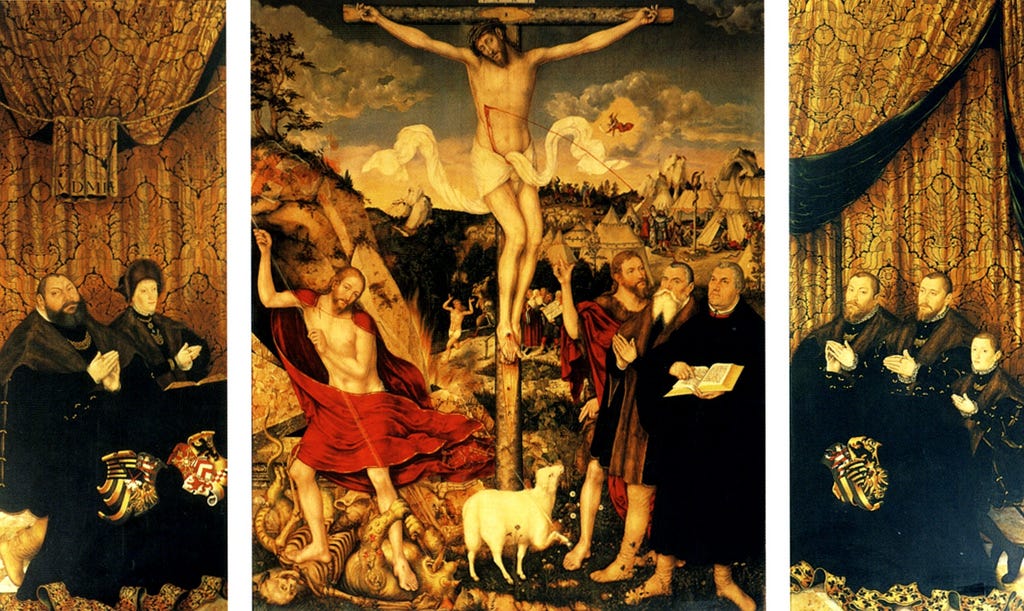Dear Friends,
Here’s a little note I just sent out to the members of St Paul, Austin. I thought it would be an encouragement to you as well.
Dear Saints,
Here’s a little story from history.
Back in 1517, the second largest collection of religious relics belonged to Fredrick the Wise of Wittenberg. (The largest collection, you might guess, was in the Vatican.) The "inventory of 1518 listed 17,443 items, including a thumb from St. Anne, a twig from Moses’ burning bush, hay of the holy manger, and milk from the Virgin Mary. Money was paid in order to venerate these relics and thus escape years in purgatory. A diligent and pious person who rendered appropriate devotion to each of these relics could merit 1,902,202 years worth of penance." (Marty, Martin Luther: A Life, p.18, see Fredrick the Wise wikipedia here.)
Once a year on All Saints’ Day (November 1) Fredrick would display these relics in the Castle Church, and thousands of pilgrims would flood into Wittenberg to visit the relics and receive the spiritual graces they would offer.
Now imagine the night before this grand opening of the relic display, October 31, Martin Luther, a 34-year-old monk and professor, pressing through this crowd of pilgrims to post his Ninety-Five Theses on the Power and Efficacy of Indulgences on the doors of the same Castle Church filled with relics. All the people would be presented with this challenge: you are making salvation too easy!
Many people thin Luther’s complaint against the Church in Rome was making salvation too difficult. Only through a life of good works can we attain salvation. But Luther, in his theses, says the opposite. "If you can purchase forgiveness, then why did Jesus need to suffer and die?"
Consider Theses 40 & 41:
40. True contrition seeks and loves penalties, but liberal pardons only relax penalties and cause them to be hated, or at least, furnish an occasion [for hating them].
41. Apostolic pardons are to be preached with caution, lest the people may falsely think them preferable to other good works of love.
Or the last two Theses, 94 & 95:
94. Christians are to be exhorted that they be diligent in following Christ, their Head, through penalties, deaths, and hell;
95. And thus be confident of entering into heaven rather through many tribulations, than through the assurance of peace.
With these Theses Luther changed the theological conversation of the church, and brought forward the importance of repentance, that is, the certainty that (1) we are sinners (2) forgiven and rescued by Jesus.
This is what we remember and celebrate on Reformation Day: the clarity of Christ for sinners! It is what we will remember and celebrate tomorrow.
Our readings are Revelation 15:6-7 (the old Lutherans saw a picture of Luther in the preaching angel), Romans 3:19-28 (perhaps the Scriptures clearest articulation of Justification by faith apart from the works of the Law), and John 8:31-36 (where Jesus speaks of the freedom of the children of God).
We’ll sing A Mighty Fortress (Luther’s Psalm 46 hymn) and my favorite Lord, Keep Us Steadfast in Thy Word (Luther’s Trinitarian prayer for faithful teaching, written for his children). I’m planning to preach on the Kyrie, and Luther’s hymn Kyrie! God Father n Heaven Above. (This is a plan, not a promise. There’s a lot of time between now and the pulpit!)
Jonathan has placed the Weimar Altar Piece on the cover of the bulletin. It is beautiful and full of theology (Learn more about it here.)
In Sunday School we’ll continue our discussion of fulfilled vs unfulfilled prophecy, and begin looking at the epistle of the Hebrews.
And, if you are looking for more things to help get ready for Reformation, here are a few videos I’ve made:
The Story of Martin Luther’s Quiet Reformation Moment:
Did Luther actually use Psalm 46 in A Mighty Fortress?
A bunch of other Reformation videos: https://www.youtube.com/@PastorBryanWolfmueller/search?query=reformation
God be praised for the clarity of the Gospel. See you tomorrow!
Christ is risen!
Pastor Wolfmueller




In youre pod cast on the parellels between A Mighty Fortress and Psalm 46 which by the way was excellent. I have always been lead to believe when Ps 46 describes the City of God, I know the popular take is that this describes the outflowing of the Holy Spirit etc however in Rev when the City of God is described it does have the River of Life flowing in the midst of it.. Could the Psalmist perhaps be describing the New Jerusalem??